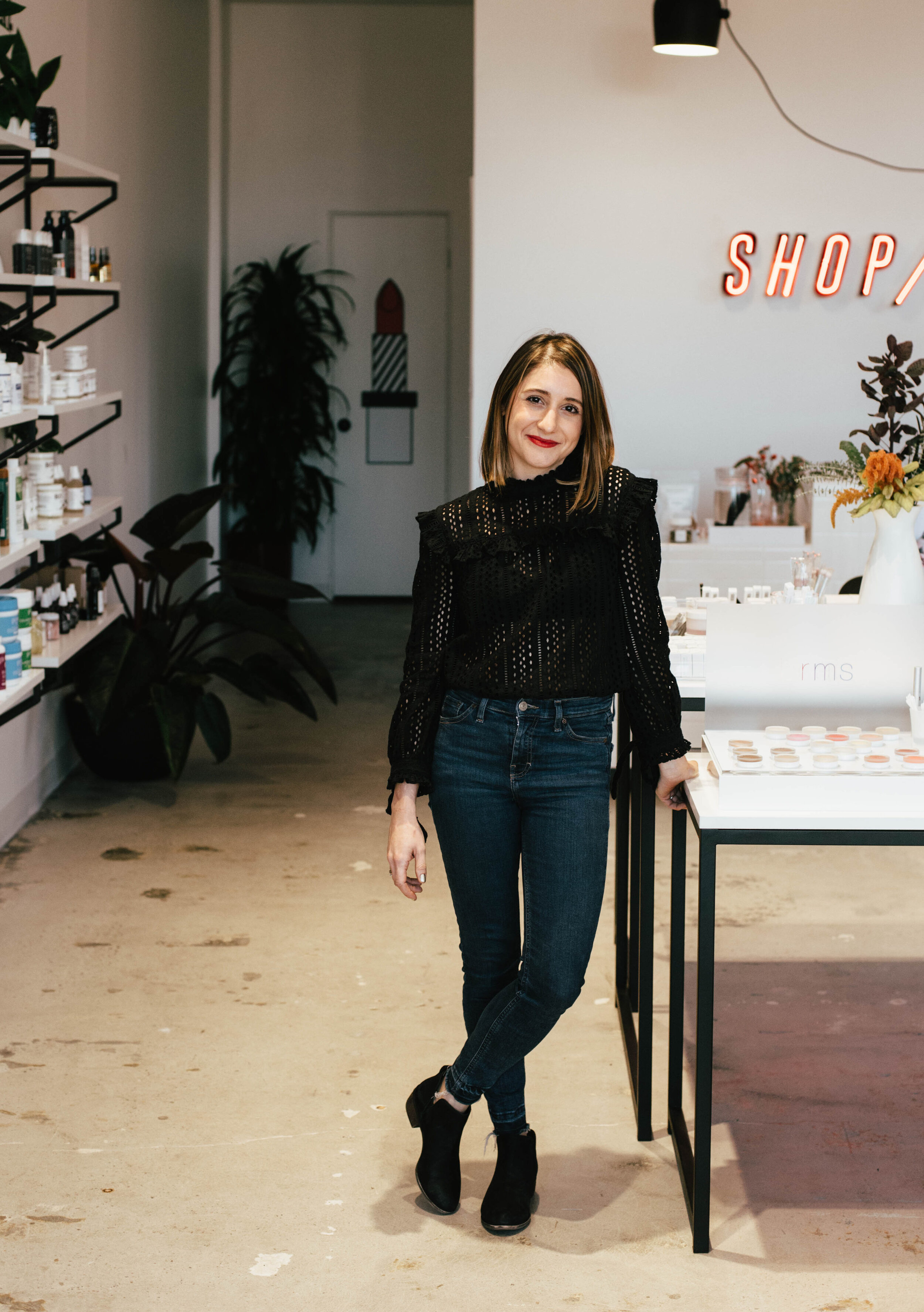Exploring Clean Skincare // Leah Kirpalani of Shop Good
Photos c/o Jay Reilly // Natasha Boote
After a series of unexplainable health issues, San Diego-based Leah Kirpalani began to shift her lifestyle to promote healing. She eventually became a Certified Holistic Health Coach, and hopes to empower and educate others about healthy living with her wellness shop, Shop Good. Leah also enjoys a nice glass of red wine after a busy workday, ordering takeout, and taking walks with her husband and dog.
Why is clean skincare important?
Up to 65% of what we place on our bodies is absorbed into our bloodstream. But the FDA has very few regulations around the ingredients used soaps, scrubs and serums. Many of the ingredients in traditional skincare products have been linked to health issues and even long-term disease. Exposure of these chemicals adds up over time, so it’s incredibly important to look at what might be lurking in your beauty cabinet and skincare arsenal. Unfortunately, marketing can be misleading. Just as skincare ingredients aren’t regulated, product claims and labels aren’t either. A face wash may tout white and green packaging or claim to be “natural” or “gentle,” but that doesn’t mean it is. It’s important to be aware of which ingredients to avoid and how to identify quality skincare… and to find partners like Shop Good to do the work for you!
What are the benefits of using natural products?
When you use quality natural products, you can honor your body in a way that heals, nurtures and beautifies. I love to think of my natural skincare products as “wellness tools” because they are infused with organic healing agents like calendula (super anti-inflammatory), witch hazel (anti-bacterial) and geranium (hydrating from the outside-in). I can practice this critical self-care utilizing these incredibly healing plant botanics… all during my existing morning and nighttime routine!
What classifies something as a “clean” product?
This is a difficult question since the term “clean beauty” is becoming more common. A few things I look for when vetting a “clean” product for Shop Good:
It must be free of parabens, SLS, phthalates and other endocrine disruptors.
Where are the ingredients being sourced? From a nearby farm that utilizes sustainable practices? Or from a cheap source overseas?
What is the manufacturing process? Is it being outsourced to large factories, which might result in contamination? Or does the company use a small-batch, in-house approach where quality can be consistently held to the highest standard.
Organic doesn’t necessarily mean safe (lead is organic but toxic). Which ingredients do you avoid?
Parabens, sodium lauryl sulfate (SLS) & sodium laureth sulfate (SLES), nanoparticles, led, mercury or other heavy metals, mineral oil, formaldehyde, oxybenzone, phthalates, toluene, and synthetic fragrance.
Any favorite beauty hacks?
I love keeping Eucalyptus Oil in my shower. I’ll place a few drops in my hands, cup them over my mouth and take 5-10 deep belly breaths. It’s amazing how it works to clear the mind when I’m feeling rushed! I also use masks throughout the week to keep my skin in good shape. I’ll use my favorite hydrating mask in the morning and hop in the shower. The steam helps the plant botanics to absorb and seep into my pores, and I can simply rinse it off at the end of my shower!
Do the terms “Clean Skincare” and “Cruelty Free” go hand in hand?
Truly clean skincare should always be cruelty free. I believe in the simple power of plants from makers who practicing sustainable sourcing. It’s important to know where the product is sourced and how it was made. Get to know your skincare makers!
What are your 5 must-have products?
Botnia's Hydrating Serum. Botnia holds a special place in my heart because their products healed my skin from acne, and Botnia’s founder has been my mentor for almost a decade! Their Hydrating Serum is one of my all time favorite products. It’s scentless and weightless, but after using it I see a difference in my skin's moisture content, buoyancy, clarity and suppleness.
TMF Vegan Lips in Bianca. Who says you can't rock a bright red lip while still using all-natural products? This lipstick is the best I have found in super-pigmented, long-lasting and matte natural color. I swipe it on in the morning and reapply maybe once throughout the day. With oils like avocado, jojoba and castor, the lipstick is hydrating, never drying, but also never slips off.
Alima Pure Satin Matte Foundation. I never thought I would be a powder foundation girl, but I will never go back to a liquid. It has just 3 ingredients and provides a very satiny-smooth but ultra-matte finish.
Wyld Facial Sponges. I love to boost my cleansing routine with this handy sponge made from 100% natural Konjac plant root that softens when wet. It works to gently exfoliate and scrub the beneficial properties of your cleanser deeper into your pores. I notice my skin looking brighter, less dry and flaky, and I have fewer breakouts when I incorporate it on a daily basis!
Suntegrity Face Sunscreen + Primer. Never leave the house without it! I grew up in Arizona and disregarded my mother's warning about using sunscreen. So today in my 30's, I have to protect my skin every single day. This product perfectly fits into my daily beauty routine. It provides an SPF of 30 and also works as a primer.
What are some easy ways to start transitioning to clean beauty products?
Eliminate unnecessary items
Start with frequently used products
Begin with replacing what you are running out of first
Focus on products that are often ingested such as lip gloss and lipstick
Avoid products that have artificial fragrances or flavors added
XO,
Leah Kirpalani






